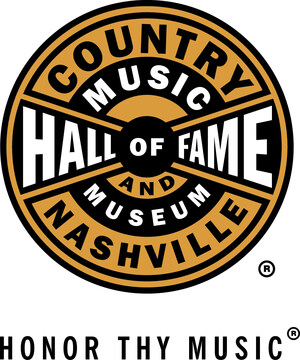NASHVILLE, Tenn., Dec. 8, 2022 /PRNewswire/ -- The Country Music Hall of Fame® and Museum will explore the musical contributions of Dick Curless (1932-1995) in a new exhibit focused on the Maine singer's life and career. Dick Curless: Hard Traveling Man from Maine opens Friday, Jan. 13, and runs through Jan. 7, 2024.
Curless — best known for his 1965 national hit, the truck-driving anthem "A Tombstone Every Mile" — was one of the most versatile and powerfully eloquent singers of his time. Known for his expressive baritone voice and hard-traveled authenticity, Curless placed more than 20 hit recordings on the Billboard country charts.
The exhibit will trace Curless's life and legacy, from his rural Northeast upbringing and popular truck-driving songs of the 1960s and '70s, to his 1995 return to recording with his critically acclaimed final album, Traveling Through.
"Dick Curless sang country music with conviction and commitment," said Kyle Young, CEO of the Country Music Hall of Fame and Museum. "Though he was not a household name, he was admired by his musical peers from Nashville to Bakersfield, and of course by his many fans nationwide. He created memorable and distinctive music that reflected his working-class roots and life experiences."
Dick Curless: Hard Traveling Man from Maine will feature a selection of instruments, stage wear and personal artifacts donated to the museum's collection by the Curless family. The exhibit is guest co-curated by music historian and award-winning author Peter Guralnick, who wrote an extensive profile on Curless in his 2020 book "Looking to Get Lost: Adventures in Music and Writing."
Some of the artifacts on display in the exhibit will include:
- Regal archtop guitar – Curless's first guitar, which was given to him when he was a boy by his father's friend Emery Fields, who taught him how to play the instrument.
- Martin guitar – The 1964 Martin D-28 guitar, with rosewood back and sides, was owned and used extensively by Curless.
- Jacket – Curless wore the blue and black floral brocade jacket at his shows and on the cover of The Soul of Dick Curless, his 1966 album of bluesy material reflecting the influence of blues guitarist and singer Josh White.
- Stage wear – The three-piece, pinstriped western suit, with contrasting piping and decorative stitching, was designed for Curless by rodeo tailor Nathan Turk.
- Leather boots – Curless wore the custom-made patent leather boots, which are embellished with Curless's nickname, "The Baron," after the title of one of his songs.
- Adamas acoustic-electric guitar – Curless owned and played the Adamas 1687 acoustic-electric guitar often in the latter part of his career.
- Suede jacket and hat – Curless wore the Pioneer-brand suede jacket with fringe and Stetson hat on the cover of his final album, Traveling Through (1995).
In support of the exhibit opening, Guralnick will lead a discussion exploring Curless's life and music on Saturday, Feb. 18, in the museum's Ford Theater. Joining the conversation will be musician, producer and artist manager Jake Guralnick, Peter's son, who produced Traveling Through for Rounder Records. Chuck Mead, co-founder of country band BR549 and longtime Americana solo artist, will perform briefly in tribute to Curless. Tickets are available here.
About Dick Curless
Born on March 17, 1932, in Fort Fairfield, Maine, Curless was influenced at an early age by the music of Country Music Hall of Fame member Jimmie Rodgers and his father, Phil Curless, a bulldozer operator who could bring family members to tears with his emotive singing.
After his family relocated to Gilbertville, Massachusetts, Curless got his professional start performing at age 17 through local singer Yodeling Slim Clark (Raymond LeRoy Clark), who put him on the radio and dubbed him the Tumbleweed Kid. The following year, Curless quit school just weeks before his high school graduation to go on tour with Clark.
Curless eventually married and settled in Bangor, Maine, and, in 1952, he was drafted and sent to Korea. He got his own radio program on the Armed Forces Korea Network, performing and playing records as the Rice Paddy Ranger. The show became so popular that soon it was broadcast throughout the Far East.
After he was discharged from the army in 1954, Curless returned home and began his recording career at the age of 24 on the Maine-based label Event Records. His initial recording success, including the folk-inflected song "Streets of Laredo," garnered him national television exposure for a full week on "Arthur Godfrey's Talent Scouts" on CBS.
In 1964, Curless recorded "A Tombstone Every Mile," a doom-filled trucking song that eventually rose to #5 on the country charts. The following year, he was named Most Promising New Male Vocalist by Cash Box magazine and was later signed by Buck Owens's management, production and publishing company. He toured nationally with Owens, appearing in sold-out shows at Carnegie Hall and the Hollywood Bowl.
Curless was eventually nicknamed the Baron of Country Music after his 1966 recording "The Baron," and became well-known for his truck-driving songs, including his hits "Big Wheel Cannonball" and "Hard, Hard Traveling Man." He began wearing a black eye patch, which became an indelible part of his image, when worsening vision in his right eye became too problematic.
He continued to have chart success through 1973. He recorded his final album, Traveling Through, just months before his death in 1995. The album — a rootsy exploration of the sad and spiritual sides of country, blues and gospel music — was an artistic high point and a culmination of Curless's lifelong devotion to country music.
More information about Dick Curless: Hard Traveling Man from Maine can be found here.
Photos of artifacts featured in Dick Curless: Hard Traveling Man from Maine can be found here.
The Country Music Hall of Fame® and Museum collects, preserves and interprets country music and its history for the education and entertainment of diverse audiences. In exhibitions, publications, digital media and educational programs, the museum explores the cultural importance and enduring beauty of the art form. The museum is operated by the Country Music Foundation, a not-for-profit 501(c)(3) educational organization chartered by the state of Tennessee in 1964. The museum is accredited by the American Alliance of Museums, and is among the most-visited history museums in the U.S. The Country Music Foundation operates Historic RCA Studio B®, Hatch Show Print® poster shop, CMF Records, the Frist Library and Archive and CMF Press. Museum programs are supported in part by Metropolitan Nashville Arts Commission and Tennessee Arts Commission.
More information about the Country Music Hall of Fame® and Museum is available at www.countrymusichalloffame.org or by calling (615) 416-2001.
SOURCE Country Music Hall of Fame and Museum

WANT YOUR COMPANY'S NEWS FEATURED ON PRNEWSWIRE.COM?
Newsrooms &
Influencers
Digital Media
Outlets
Journalists
Opted In





Share this article